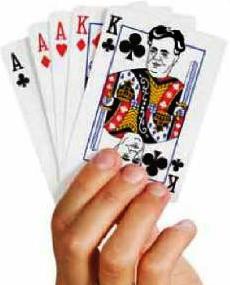 Source: ACBL
Source: ACBL
Jumping around — using splinters to show shortness
Splinter bids are unusual jumps to show trump support and shortness (a singleton or void) in the suit bid. Consider the auctions below. Can you describe what is needed to make that bid? To help you, consider a good rule: A splinter is a bid that is one level higher than necessary, such as one higher than a jump shift or one level higher than a reverse. Look at this auction:

A jump to 2![]() would be a strong jump shift. The 3
would be a strong jump shift. The 3![]() bid, therefore, shows a singleton or void in spades and shows enough points for game. Because the 1
bid, therefore, shows a singleton or void in spades and shows enough points for game. Because the 1![]() bid promised only 6 points, opener needs about 19-20 support points for his splinter bid. A typical hand is:
bid promised only 6 points, opener needs about 19-20 support points for his splinter bid. A typical hand is: ![]()
This hand has 17 points and it has a singleton. In support of hearts, it’s worth around 20 points. The nice thing about this bid, as with all splinters, is that responder learns most of opener’s features in just one bid. Now consider this:

In the above auction, a 3![]() bid would be a strong jump shift. Therefore, 4
bid would be a strong jump shift. Therefore, 4![]() is a splinter bid. Because responder is only promising 6 points for a bid at the one level, opener needs a lot for his splinter bid. A typical hand:
is a splinter bid. Because responder is only promising 6 points for a bid at the one level, opener needs a lot for his splinter bid. A typical hand: ![]()
Try this one:
Would 3![]() be forcing? Yes. Because there is no need to jump to show a diamond suit, 4
be forcing? Yes. Because there is no need to jump to show a diamond suit, 4![]() is a splinter. Partner says he is interested in a slam, and, because he knows opener has 12-14 support points, responder must have an 18 count or better that smells like a slam.
is a splinter. Partner says he is interested in a slam, and, because he knows opener has 12-14 support points, responder must have an 18 count or better that smells like a slam.
A typical hand: ![]()
Splinters can be made by weak hands:

Responder bids 2![]() as a waiting bid. When opener bids spades, responder can make a splinter bid if he has the right hand. An example:
as a waiting bid. When opener bids spades, responder can make a splinter bid if he has the right hand. An example: ![]()
What is 4![]() in this auction?
in this auction?

The usual rule applies: Responder could bid 3![]() to force, so his jump is a splinter — it is not Gerber. I suggest you abandon Gerber except on very clear situations. In this case, responder has good diamonds and is showing heart support, too, along with club shortness. A typical hand:
to force, so his jump is a splinter — it is not Gerber. I suggest you abandon Gerber except on very clear situations. In this case, responder has good diamonds and is showing heart support, too, along with club shortness. A typical hand: ![]()
Consider this auction: 
Because 3![]() would be forcing, 4
would be forcing, 4![]() is a splinter. A splinter generally delivers four trumps. But note that if responder had four spades, he could have made a splinter on the first round. When he bids 2
is a splinter. A splinter generally delivers four trumps. But note that if responder had four spades, he could have made a splinter on the first round. When he bids 2![]() and then jumps, he suggests only three spades:
and then jumps, he suggests only three spades: ![]()
What better way to describe this hand? Responder shows clubs and then shows his three-card support along with his singleton heart. Let’s see how this influences opener. Here are two hands he might have.
With: ![]() , opener would realize that his
, opener would realize that his ![]() K Q 8 were not working cards and sign off in 4
K Q 8 were not working cards and sign off in 4![]() .
.
Now suppose he has this hand: ![]()
In this case, opener would realize that this 14-point hand is gold. All of his points are working and he has nothing wasted in hearts. Slam is not cold, but good enough to bid.
